Following up yesterday's personal strategic TEDxKC reflection, today's TEDxKC review focuses on specific presentations at the August 12, 2010 strategic, innovation-rich event. In keeping with the brisk TED/TEDx format (no presentations are intended to be over 20 minutes), here are brief highlights from TEDxKC:
 Francis Cholle - Intuitive Intelligence Is What the World Needs Now
Francis Cholle - Intuitive Intelligence Is What the World Needs Now
Author Francis Cholle's main premise is strategic business thinking typically ignores creativity and doesn't recognize the importance of the unconscious in how we process information. His model for intuitive intelligence rests on 4 strategies:
- Think Holistically - Look at situations from all possible perspectives.
- Think Paradoxically - As you look from different perspectives, allow yourself to accept blatantly contradictory elements co-existing together.
- Listen for the Unusual - Pay less attention to thinking and more attention to feelings our brands' customers are having.
- Lead by Influence - Surrender control and give people the autonomy to step off into the unknown.
Given this strategic approach is at the heart of what we're trying to do with innovation at Brainzooming, his talk really resonated with me.
Jane McGonigal - More Online Gaming Is What the World Needs Now
From her innovative perspective as an online game designer, in the only video presentation at TEDxKC, Jane McGonigal shared her firm belief the world is spiraling to its imminent collapse and can only be saved by the types of epic wins taking place 24/7 in online gaming.
She shared how online gaming allows people to rapidly try, experiment, and learn effective innovative problem-solving in epic situations. Online games do this particularly well because they are built around epic stories requiring epic strategies, players are matched to challenges suiting their talents with tons of collaborators, and feedback is constantly provided to innovate, adjust, improve, and succeed.
In the past several years, she's concentrated on developing online games focused on solving major world problems - energy (World without Oil), human extinction (Superstruct), and the crisis in Africa (Evoke).
Her global prescription is for the people of the world to spend 21 billion hours per week in online gaming to innovate and create the epic wins which will allow the world to survive. While my initial reaction was very much, "WTF," I'm so thankful Jane McGonigal's video was included at TEDxKC. She ultimately helped me see a previously unsuspected connection between online gaming, strategy, and rapid process improvement techniques and how they could work together to catalyze innovative global problem-solving strategies.
Dr. Michael Wesch - Meaning Makers Are What the World Needs Now
Kansas State University anthropology professor Michael Wesch, the YouTube star of the evening, spoke to the need for individuals to move from knowledgeable to knowledge able, with skills and critical thinking capabilities to successfully filter the blast of media we all receive daily. As he pointed out, technology has wrought absolutely revolutionary expansions in our capability to:
- Connect
- Organize
- Share
- Collect
- Collaborate
- Publish
Importantly though, Wesch's point was while technology makes it easy to perform these six activities, they are tremendously hard to do well. The challenge then is using the technical tools to become compelling meaning makers and not just meaning seekers.
Mike McCamon - A Way to Deal with Waste Is What the World Needs Now
I have at least a passing knowledge of McCamon's water.org organization through meeting Erin Swanson of water.org (@ExplodingSoul on Twitter) regularly at Social Media Club of Kansas City breakfasts. For whatever reason, McCamon's TEDxKC presentation was incredibly brief. It provided staggering statistics about the amount of solid human waste that's left untreated globally in a world where more people have access to mobile phones than toilets. His contention is the issue doesn't get more attention because it's a private one whose solutions are realized household-by-household and the very visual celebratory experience which exists with clean water solutions (i.e., kids playing in water) doesn't exist with solid waste solutions.
At one point during TEDxKC, McCamon said, "Someone always lives downstream." While the comment was delivered most directly to water and sanitation issues, its much larger application is for all processes globally, big to small, where one group or individual tries to get the good stuff for themselves only to let the next person down the line deal with the negative aftermath.
Dr. Brené Brown - Vulnerability Is What the World Needs Now
At the core of Dr. Brown's comments is the contention we are losing our tolerance for vulnerability. Rather than vulnerability being synonymous with weakness, Brown sees vulnerability as the birthplace of joy, creativity, faith, and many other very positive aspects of life. As the rejection of vulnerability has spread, we now find:
- Joy has shifted to foreboding
- Disappointment has developed as a lifestyle
- Perfection (or the perception of perfection) is used as a false shield
- Extremism surfaces as a defense mechanism
- Medications, alcohol, drugs, credit, and all types of other things are used to numb the pain
She challenged the TEDxKC audience to regain joy in our lives by practicing gratitude and honoring the ordinary in life since filling emotional reservoirs with joy and love is critical to getting through bad things which may eventually happen.
Quixotic Fusion - Both a Skeptical and a Hopeful Eye Is What the World Needs Now
This intriguing performance art group Quixotic Fusion opened and closed TEDxKC. It's important for me to say upfront, "I don't get dance." I so don't understand dancing, I've threatened to make myself take a class about choreography to force at least some better strategic sense of it.
As a result of my cluelessness about dancing, let me just say the take-away for me of the Quixotic Fusion TEDxKC performance was a strategic reminder about illusion. You can put separate elements together (i.e. a dancer and pre-programmed light patterns), and with skill, you can create the appearance of a causal relationship that doesn't really exist. If you're prone to seeing causality in everything, the strategic message is be careful about jumping to conclusions. If, however, you're a literalist who thinks everything has to be exactly as it is, realize you have some creative room to play with, so take advantage of it.
That's the presentation recap from TEDxKC, a tremendously content-rich strategic innovation event! Thanks to sponsors VML, Populous, The Nelson-Atkins Museum of Art, and Harvest Productions for staging TEDxKC for the Kansas City community! – Mike Brown
When it comes to conferences, high impact presentations, and live event social media content, The Brainzooming Group is expert at shaping the right strategy and implementation to create unique attendee experiences before, during, and after an event. Email us at brainzooming@gmail.com or call 816-509-5320 to learn how we can do the same for your event!



